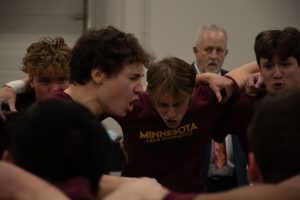Editors note: This is the first of a three-part weekly series that will examine University President Mark Yudof’s record at the University of Texas-Austin and his plans for the University.
Chris Hamilton
AUSTIN, Texas — Last summer, University President Mark Yudof marched north from the sun-baked, Spanish-tiled roofs of the University of Texas-Austin to the still winter-pocked streets of the University.
He packed a warm cap and a slew of ideas for programs and initiatives from the campus where he cut his teeth during the last 26 years.
More than a half-dozen of Yudof’s Texas accomplishments are in progress or on tap at the University. A new integrated budgeting and academic planning process and an academy to recognize outstanding undergraduate teaching are currently making headway.
“I like to think I’m very pragmatic and opportunistic,” Yudof said. “I’m just looking at what seems to be the need and what works well.”
While executive vice president and provost at the Austin university from 1994 to 1997, Yudof had a hand in creating a new molecular and cellular biology department and a digital science program. They’re complete with respective $26 million and $12 million new facilities.
He spearheaded major classroom improvements and pushed for digitalizing library materials. Yudof actively recruited superstar faculty — once he sent roses to a prospective professor.
He also sat in on preparations for a $1 billion private capital fund-raising campaign for faculty salary increases and scholarships.
Yudof acknowledges his achievements at Austin as a predominant factor in his hiring.
“I am a fast track guy,” Yudof said. “I don’t think we should spend years and years in the process. I think we ought to aggressively move the U ahead. That’s the philosophy I’ve tried to take with me. I think that’s what the regents, the legislature and the faculty expect.”
Yudof was hired on his ability to procure funds from private sources and a stingy Texas legislature, said Regent Jessica Phillips. In Austin, 26 percent of the school’s funding comes from the state compared to about 40 percent in Minnesota.
And for now, success for most comparable University initiatives hinges on Minnesota legislative support this session. While also addressing system-wide building renovations, University officials will ask the state for $248.9 million capital and $44 million supplemental budget requests.
Administrators want another $227 million capital request in 2000. The University would match the state’s share. If approved, part of the total $820 million would go toward funding the new plans. This is a departure from some of the Austin programs, which were mostly funded through private donations.
Compacts and Academics
Yudof insists the programs won’t be cookie cutouts from Austin. Instead they will be tailored to fit the unique University and state, he said. More shared faculty governance, an emphasis on agriculture and wading through more administrative bureaucracy are fundamental differences Yudof identified.
One plan in particular, Compacts — the budgeting and academic planning initiative — has to be handled differently in Minnesota. Some of U2000, a system-wide goal setting measure started by former University President Nils Hasselmo, will be a component of the Compact. Yudof said the basic Austin structure is transferable. It should be in operation by the spring.
In Texas, it was called Compact 2000 and had its start during the 1994-95 school year. Deans of colleges meet individually with the provost’s office to formulate strategic planning for a two-year cycle.
After discussion, a written agreement is produced that illustrates how these goals will be accomplished. The Compacts are then made public and shared between colleges.
“I’m a self-described nut,” Yudof said. “I need to know exactly how measures will improve student life.”
The provost and deans in Austin come to the meeting equipped with extensive amounts of data from each perspective. Information such as cost per semester hour, student-teacher ratios, endowments and degrees conferred are taken into account. The available resources are openly presented by the office.
“This is the first time we ever pulled together a really comprehensive data set,” said Stephen Monti, Austin interim executive vice president and provost. “We have a much better data base for decisions to be made.”
An original aspect of Compacts are its benchmarks for measuring success. Accountability can be determined by looking at the progress made toward certain goals. The results are used as a starting point for the next Compact negotiation.
Some deans from Austin said the benchmarks helped them better prepare for the upcoming year, lessening the number of trips to the provost’s office for extra funding.
“Any technique which requires an official to focus on prioritizing and how to work within budget restraints is advantageous,” said Michael Sharlot, dean of the Austin law school.
The competency of deans is also evaluated. But Yudof said reprimanding is done in the most constructive way possible. He said he doesn’t believe the Compacts degenerate into a budget hearing atmosphere.
At the University, Agriculture Dean Mike Martin said he looks forward to the Compacts, which would, for the first time, combine the budgeting and academic planning process.
The plan will be a departure from the old procedures. In the past, deans would be told their academic outlines were great and then in the separate budgeting process they would lose funding, Martin said. After being told to expand course offerings their faculty budget might be cut.
The plan also forces the deans to be more realistic.
“In the old days you’d promise everything to get half of what you asked for,” Martin said.
The outcome-oriented plan will prevent the old confusion, said Bob Bruininks, University executive vice president and provost.
“It’s an iterative process,” Bruininks said. “For every meeting there’s a follow up. It’s more specific and focused.”
Currently, administrators are devising Compacts with the College of Liberal Arts, College of Architecture and Library Services. He said the process has been helpful in determining long-range goals for the libraries, which include making Walter Library a hub of technology.
Yudof said most of his plans coincide in one way or another.
In the interest of creating better teachers and boosting faculty moral, he will establish an Academy of Distinguished Teachers within the next two months.
“A lot of people who felt unrecognized were brought back into the fold,” Yudof said. “It brought them into esprit.”
Specifics for the University version still need to be hammered out. But administrators said the school’s version will closely resemble the one Yudof established at Austin in 1995.
The academy was initiated to recognize and reward excellent undergraduate teachers. It is open to tenured faculty who, if elected, serve eight-year terms in the academy. Recipients get a permanent $5,000 raise, the title of Distinguished Teacher and upgraded parking privileges. There are 30 members at Austin.
Mel Oakes, an Austin physics professor and one of the first recipients, said the members are asked to develop ways to help bring good teaching to the fore. They have conducted teaching workshops and made available videotaped lectures of award winners.
“The most important aspect of the whole program was its visible recognition of undergraduate teaching,” Oakes said.
But some professors fear their being overlooked by the award.
Six members of the 10-person selection committee are either previous winners or in central administration. This makes some faculty worry about the politics of the selection process.
“I hope it doesn’t turn into a self-perpetuating bureaucracy like the old Catholic church, where they had a jillion cardinals from Italy,” said Alan Cline, an Austin computer science professor.
The selection committee for the University has not yet been determined. But administrators are confident all the details will soon be completed.








